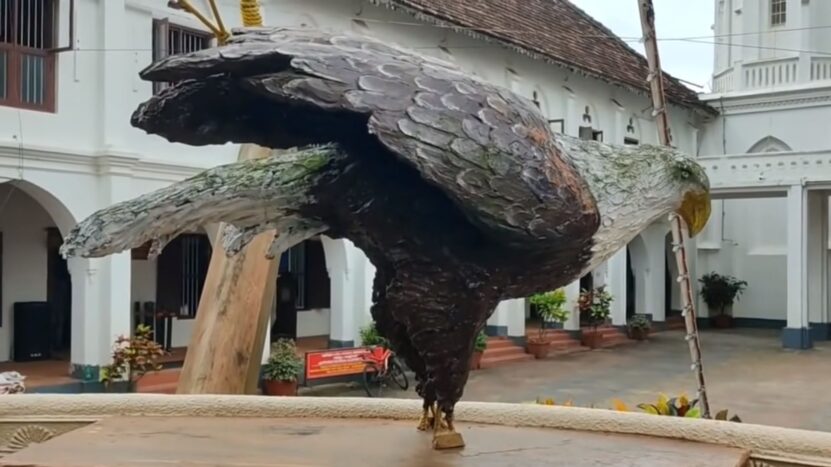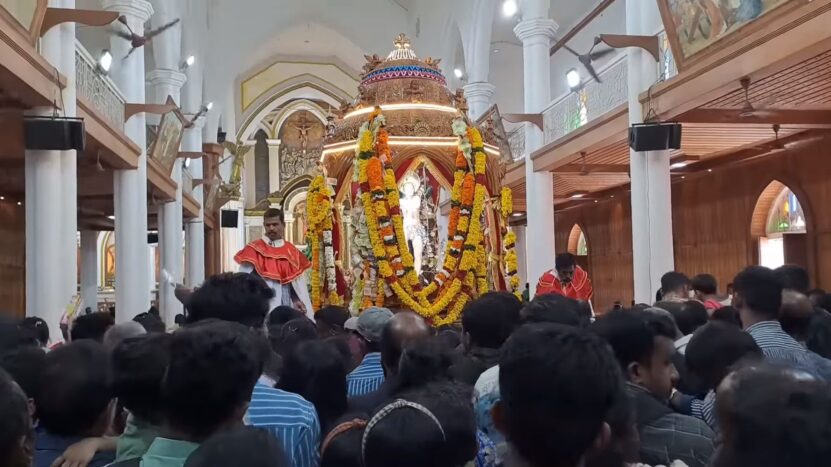Nestled in the stunning coastal landscape of Alleppey, Kerala, lies the historical and religious gem known as Arthunkal Church. This sacred edifice, also known as St. Andrew’s Basilica Arthunkal, is a symbol of faith and devotion that has withstood the test of time. Its deep roots in the cultural fabric of Kerala and the captivating stories that surround it make the church a must-visit site for anyone exploring the richness of India’s southern state.
The shores of Arthunkal and its serene surroundings make a visit to this church a rejuvenating experience. This blog post will take you on a deep dive into the history, religious importance, and architectural beauty of Arthunkal Church. So, get ready to embark on a journey that explores this iconic symbol of Kerala’s rich Christian heritage.
Historical Significance

The history of the Arthunkal Church is intertwined with the evolution of Christianity in Kerala. It was initially a small chapel established by the Portuguese missionaries in the 16th century. This chapel was dedicated to St. Andrew, and over time, it was upgraded to the status of a church by the Portuguese, thereby becoming a pivotal center for the propagation of Christianity in the region.
The Arthunkal Church has witnessed several historical events, including the missionary activities of the Portuguese, the rise of Christianity, and the socio-cultural changes in Kerala. One significant figure in the church’s history is the Italian Jesuit priest, Fr. Vincento Fenicio, who is said to have performed many miracles. His contributions led to a significant increase in the Christian population in the area during his time.
In the 18th century, the church was rebuilt with a more elaborate design, replacing the original structure. The church has been renovated and expanded multiple times since then to accommodate its growing congregation. Today, it stands as a monument reflecting the rich religious history and diverse architectural influences of the region.
Architecture and Design
The architecture of Arthunkal Church is an enchanting fusion of traditional Kerala and European designs. The façade of the church, characterized by twin towers, is a classic example of Portuguese architectural style. This harmonious blend of architectural styles serves as a physical testament to the church’s historical evolution and the cultural interactions that have occurred over centuries.
The interior of the church, adorned with beautiful murals and statues, exudes a sense of serenity. The main altar, resplendent in its detailed woodwork, holds the revered statue of St. Sebastian. Stained glass windows enrich the church with their vibrant colors, casting a divine glow inside the church, especially when the sun filters through them.
The large courtyard surrounding the church, dotted with palm trees, adds to the tranquility of the place. This open space often serves as the venue for major religious festivals and rituals. Whether viewed from a distance or experienced from within, the architectural magnificence of Arthunkal Church leaves an indelible impression.
Religious Importance and Pilgrimage Site
Arthunkal Church is more than a place of worship; it’s a significant pilgrimage site that draws thousands of believers annually. The church is particularly known for its devotion to St. Sebastian, a Christian martyr, whose statue here is believed to possess miraculous healing powers. It’s not uncommon to see devotees, regardless of their faith, paying homage and seeking solace at this sacred site.
The annual feast of St. Sebastian, a significant event at Arthunkal Church, sees a surge of pilgrims from all corners of Kerala and beyond. This 11-day feast, known as Arthunkal Perunnal, is one of the biggest Christian celebrations in the state. Pilgrims often perform the ritual called “Arthunkal Muzhukappu,” wherein they crawl on their knees from the beach to the church.
The church also holds a special bond with the local Hindu community. In a unique religious harmony, many devotees from the nearby Sabarimala Temple visit Arthunkal Church to pay their respects to St. Sebastian before concluding their pilgrimage. This highlights the church’s role as a symbol of communal harmony and spiritual unification.

The Legend of St. Sebastian and Arthunkal Church
The legend of St. Sebastian is deeply ingrained in the lore of Arthunkal Church. St. Sebastian, known for his unwavering faith, was a soldier in the Roman army who was martyred for his Christian beliefs. The statue of St. Sebastian in Arthunkal Church, brought by Portuguese missionaries, is believed to have miraculous healing powers.
As the story goes, many devotees have reported being cured of ailments after praying at the statue of St. Sebastian. The most famous legend is that of the Arthunkal Veluthachan (Fair-skinned Father), which is attributed to Fr. Vincento Fenicio. According to this tale, Fr. Fenicio, who had a great devotion to St. Sebastian, had the power to cure believers, and even after his death, his spirit continued to heal through the statue of St. Sebastian.
These stories of miracles and divine intervention have fostered deep faith among the devotees. Even today, they visit the church seeking solace, blessings, and, often, a miracle. The legend of St. Sebastian adds a mystical allure to the Arthunkal Church, making it a beacon of hope and faith.
Annual Feast and Celebrations

The annual feast at Arthunkal Church, known as Arthunkal Perunnal, is a grand affair, attracting throngs of devotees. Held in January, the 11-day feast is dedicated to St. Sebastian and features a series of vibrant ceremonies, including processions, rituals, and a grand feast.
The highlight of the feast is the ritualistic procession where the statue of St. Sebastian is carried around the town. Devotees also engage in the practice of “Arthunkal Muzhukappu,” a ritual that involves crawling on their knees from the nearby beach to the church. These traditions exemplify the profound faith and devotion that believers have towards St. Sebastian and the Arthunkal Church.
On the final day of the feast, the church is beautifully illuminated, and a solemn High Mass is celebrated, followed by a spectacular fireworks display. Apart from the religious observances, cultural events such as dance, music, and drama performances also mark the celebrations, making the feast a remarkable blend of devotion, culture, and festivity.
Arthunkal Church: A Hub for Christian Devotion and Worship
Over the centuries, Arthunkal Church has evolved into a significant hub for Christian devotion and worship in Kerala. With a strong and vibrant Christian community surrounding it, the church serves not only as a place of worship but also as a center for social and cultural activities.
The church conducts regular Mass and prayer services, catering to the spiritual needs of the community. Additionally, it hosts religious education programs, youth groups, and charity initiatives, thereby fostering a sense of community and spiritual growth among its members.
Beyond its religious duties, Arthunkal Church also plays a significant role in promoting social harmony. The church’s welcoming stance towards devotees of all faiths, its role in community development, and the spirit of unity fostered during the annual feast contribute towards establishing Arthunkal Church as a symbol of communal harmony and love.
Notable Features and Artifacts at Arthunkal Church
Arthunkal Church houses numerous notable features and artifacts that add to its charm and spiritual significance. Foremost among these is the statue of St. Sebastian, revered by thousands for its perceived miraculous powers. The intricately carved wooden pulpit and the main altar, featuring a beautiful tableau of the Last Supper, are other noteworthy elements.
The church also hosts a small museum displaying various artifacts related to its history and the spread of Christianity in the region. These include ancient liturgical objects, historical documents, and photographs that provide a glimpse into the church’s past.
One should not miss the “Miracle Pond” adjacent to the church, which is believed to possess healing properties. Devotees often take a dip in this pond seeking relief from their ailments. Together, these features and artifacts offer a rich experience of faith, history, and culture to visitors.
Services and Mass Timings
The Arthunkal Church is active throughout the year with daily services and masses. Regular Sunday Masses are conducted in Malayalam and English at various timings, offering local parishioners and tourists the chance to participate. Weekday masses, confessions, adoration services, and special prayers are also part of the church’s regular spiritual offerings.
On significant liturgical days like Easter and Christmas, special services are held, often culminating in grand processions and communal celebrations. Given the diverse crowd that the church attracts, all religious services are designed to cater to the spiritual needs of everyone.
It’s advisable to check the official website of Arthunkal Church or contact the church office for updated service and mass timings, especially during the festive season or if planning a group visit.
Nearby Attractions and Activities for Visitors

A visit to Arthunkal Church can be combined with the exploration of the surrounding attractions. Alleppey Beach, known for its stunning sunset views and lighthouse, is a popular spot for tourists. The nearby Marari Beach is another peaceful and picturesque location where visitors can relax. You might also want to visit the Hindu temples while in India. Nature lovers can enjoy a serene backwater cruise in Alleppey’s famous houseboats, offering an unforgettable experience of Kerala’s natural beauty. Those interested in local culture and art can visit the Revi Karuna Karan Memorial Museum, which showcases a diverse collection of art, artifacts, and vintage cars.
For culinary enthusiasts, trying the local cuisine is a must. Alleppey is famous for its delicious seafood and traditional Kerala delicacies. Many local restaurants and eateries around Arthunkal Church serve these mouth-watering dishes.
How to Reach Arthunkal Church and Accommodation Options
Arthunkal Church is easily accessible by road from various parts of Kerala. It’s about 22 kilometers from the Alleppey town center and can be reached via taxis, auto-rickshaws, or local buses. The nearest railway station is Cherthala, which is 8 kilometers away, and the nearest airport is Cochin International Airport, approximately 70 kilometers from Arthunkal.
When it comes to accommodation, visitors have plenty of options ranging from luxury resorts to budget guesthouses. Many accommodations offer stunning views of the Arabian Sea or the tranquil backwaters. Homestays are another popular option, providing an opportunity to experience local hospitality.
Tourists planning to visit during the Arthunkal Perunnal feast should book accommodations well in advance, as this period sees a large influx of pilgrims and tourists.
Final Words
Arthunkal Church is more than just a place of worship; it’s a symbol of faith, history, and community. Whether you’re seeking spiritual solace, intrigued by historical architecture, or simply drawn to serene and beautiful locales, a visit to Arthunkal Church in Alleppey is sure to be a memorable experience. As you explore this sacred site, you’ll not only witness a unique blend of cultures but also partake in a legacy of faith that spans centuries.

